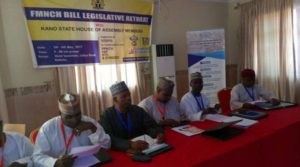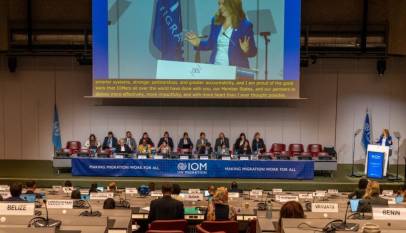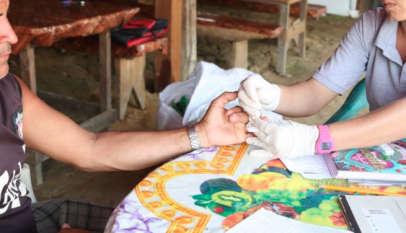YOSPIS, partners host retreat for Kano legislators on free MNCH bill

As well as being the most populous state in Nigeria, Kano also has one of the highest maternal mortality rates in the country
As well as being the most populous state in Nigeria, Kano state also has one of the highest maternal mortality rates in the country. And although there has been an existing policy in the form of a free maternal and child health executive order which came into being in 2001 courtesy of the then Governor of Kano state Rabiu Musa Kwankwaso, thousands of women continue to lose their lives to pregnancy and childbirth related complications in Kano State.
Working with the support from Champion for Change (C4C), an initiative of the Public Health Institute (PHI), Youth Society for the Prevention of Infectious Diseases and Social Vices (YOSPIS) had, in 2016, spearheaded the establishment of a service charter for Kano State’s Free Maternal, Newborn and Child Health Services program, which aims to empower Kano citizens to be able to demand for accountability in the delivery of the government’s free maternal, newborn and child health programme.
Moreover, whereas over 1000 pregnant women continue to die per 100,000 live births, only 50% of pregnant women access antenatal care services, and only 13% of deliveries in Kano are attended to by skilled birth attendants and only 11% of deliveries in the state take place in a healthcare facility.
Therefore, in order to reverse the unfortunate trend of maternal mortality in Kano state, for over the past 10 years, various coalitions of civil society organisations in the state have been campaigning for a law on free maternal, neonatal and child health services in the state.
Recently, with the support from C4C/PHI, YOSPIS and a group of Kano CSOs that include Partnership for the Promotion of Maternal and Child Health (PPMCH), the Voice and Accountability Platform (VAP), Budget Tracking Group (BTG) as well as the Resource Centre for Human Rights and Civic Education (CHRICED), have been working on a private bill for free maternal health care law in the state.
And it was in an effort to study and discuss about the draft bill that these group of civic organisations hosted a select team of members of the Kano State House of Assembly (KSHoA) to a 2-day retreat in Kaduna last week, to finalise on arrangements for the draft bill to be presented to the Assembly for review, presentation on the floor of KSHoA and eventually first reading.
“The Assembly is seriously committed to the passage of this bill in good time,” says Honorable Yusuf Atta, majority leader of the Kano State House of Assembly and chair of its ad-hoc committee on private bills. “We appreciate the efforts of YOSPIS, PPMCH, BTG, VAP and CHRICED and after these deliberations, we have asked them to formally write to the Assembly through the office of the speaker.”
Hon Atta, who said the bill on maternal and healthcare law was timely added that, as legislators, they were disturbed about Kano state’s maternal mortality rates. “I will assure you that in 2 months’ time we will pass it into law, and if not for the upcoming Ramadan, it could be passed within one month,” he pledged.
“Although we have policies and an executive order on free maternal healthcare, this bill is passed into law, alongside the healthcare trust fund law, which will provide for a certain percentage of the state’s revenue to be dedicated to healthcare. We will also make sure that a certain percentage of the trust fund is dedicated to maternal healthcare,” he added.

Muhammad Sageer is the executive director of Youth Society for the Prevention of Infectious Diseases and Social Vices (YOSPIS) who said although there was a 17-year old executive order on free maternal healthcare services in the state “successive governments may decide not to implement it, therefore, the law will compel subsequent governments to implement the program.
“It’s also an opportunity for the under privileged to seek medical care. The law will also give legal backing to the program and bring about accountability and sustainability which will help bring down the numbers of women dying of pregnancy and childbirth related complications,” he said.
Mr. Ibrahim Zikirullah, the executive director of The Resource Centre for Human Rights and Civic Education (CHRICED) believed that removing the state from global and national maternal mortality map was both ultimately in the political interest of the Kano state government and people of Kano state adding that “the future of Kano state lies in the belly of its mothers.”
“We have had policy briefs, political statements and executive orders in respect of free maternal healthcare but all of this are not enough to hold anybody accountable for these services. So, if this bill sees the light of the day it will to a great extent reduce maternal mortality in Kano state and make the state a pacesetter in terms of making maternal healthcare free in Nigeria,” said Isiyaku Ahmed of the Voice and Accountability Platform (VAP).
AB Ahmed is a professor private and commercial law at Bayero University, Kano and the consultant who drafted the maternal healthcare bill for the CSOs. He believes “there is need for a law that will put a responsibility on everyone (government, medical workers and the general public) in relation to protecting the lives of pregnant mothers and make them accountable for the responsibilities vested on them.”
Stakeholders believe the passage of the free maternal healthcare bill is timely and will add value to the free MNCH program in the state.















